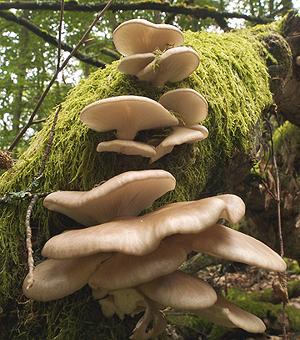 [Abalone Mushrooms, Pleurotus ostreatus, P. sapidus,
P. pulmonarus, P. citrino-pileatus and species, all
within family Pleurotaceae]
[Abalone Mushrooms, Pleurotus ostreatus, P. sapidus,
P. pulmonarus, P. citrino-pileatus and species, all
within family Pleurotaceae]
Oyster Mushrooms come in a number of varieties in different sizes and colors, generally of mild flavor. The off-center stem is characteristic and many are fan shaped, highly irregular and overlapping. some varieties are highly perishable, lasting only a few hours, but some are quite durable. Here on the West Coast of the United States, there is a tremendous interest in cultivating mushrooms, combining techniques from Asia with those developed by growers of "magic mushrooms", and a number of new varieties of Oyster Mushroom are now available here.
Sorting mushroom varieties is difficult, because members of the same species can take a number of different forms. Some Oyster Mushrooms, including the King Trumpets, and Common Oyster Mushrooms, kill and consume nematodes (round worms) for additional nutrition. Photo of P. pulmonarius by Jörg Hempel distributed under license Creative Commons Attribution-ShareAlike v3.0 Germany attribution required.
More on Mushrooms.
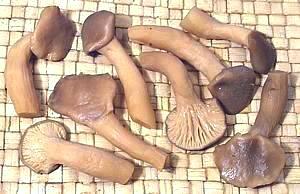 [P. cystidiosus]
[P. cystidiosus]
This is a small oyster mushroom raised in Taiwan, Thailand and China
for canning and export. The texture is fairly firm, as befits a canning
mushroom, and as with all oyster mushrooms, the flavor is mild.
Personally I think they should rename this mushroom because if anything
deserves to be called "Abalone Mushroom" it's the
Bailinggu.
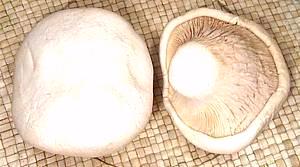 [Bai-Ling, Bailing, Abalone Mushroom, Pleurotus tuoliensis -
formerly Pleurotus eryngii var. ferulae, Pleurotus
ferulae var. Lanze, Pleurotus eryngii var
tuoliensis and others]
[Bai-Ling, Bailing, Abalone Mushroom, Pleurotus tuoliensis -
formerly Pleurotus eryngii var. ferulae, Pleurotus
ferulae var. Lanze, Pleurotus eryngii var
tuoliensis and others]
If any mushroom deserves the name "abalone mushroom" this is the one. Growing to about the size of a very large abalone (the kind you can't get any more), sliced it looks like abalone steaks and when cooked it even tastes a bit like abalone. It's very meaty and almost chewy, this is a really fine mushroom. It is also very durable, able to last more than a week loosely bagged in the fridge.
This mushroom is native to the northwest of the Xinjiang Uygur (not
so) Autonomous Region of China, but is also found in Iran and probably
other modeately arid regions where the Giant Fennel (genus Ferula)
is native. In the wild, it is always found in association with these
plants. This mushroom is now commercially cultivated in China, and was
easily found in Asian markets here in Los Angeles in 2012 and 2013, but
I haven't seen the lately (2018, 2019). The photo specimen on the left
was 4-1/2 inches across and weighed 5-1/2 ounces, about average. The
photo specimens, purchased in a large Asian market in Alhambra, sold for
2012 US $3.99 / pound, but up to double that in some other markets.
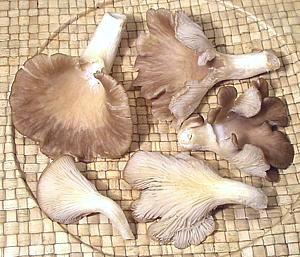 [Pleurotus ostreatus, P. pulmonarius and others]
[Pleurotus ostreatus, P. pulmonarius and others]
This mushroom grows as a series of tightly packed shelves on the side of tree trunks. It's very fragile, cooks tender but not mushy, and easily absorbs flavors, having a very mild flavor itself. In years past you could only get them canned, but fresh ones have become quite common, at least in Southern California. They are always used cooked, having a touch of bitterness raw. The largest of the photo specimens was 3 inches across. These are often torn up rather than sliced.
There are a number of varieties which vary in color and durability.
The photo specimens were purchased from an Asian market and are pretty
sturdy - with care they'll last up to 4 days loosely bagged in the
fridge. Some lighter colored ones from another market were extremely
fragile and deteriorated noticeably by time I got them home. Some
wild varieties are noted for deteriorating to unusability in several
hours.
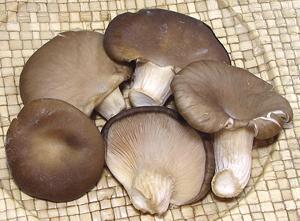 [Pleurotus pulmonarius?]
[Pleurotus pulmonarius?]
This form has become increasingly available in Southern California,
and is far superior to the Common Oyster Mushroom as its flavor is
robust and the caps are relatively strong. It's storage characteristics
are good. In it's foam tray, lightly covered in plastic, it will be
usable for a week or so. It is sturdy enough for cooking whole, slicing,
dicing and other cooking applications. With luck, these will pretty
much replace the common oyster mushroom within a few years. The
largest of the photo specimens was 3-1/4 inch across. They were
packed by a California mushroom grower, but were actually grown
in China. 2017 US $3.98 / pound.
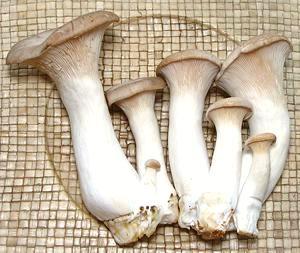 [King Oyster, Royal Trumpet; Eryngii (Japan);
Brauner Kräuter-Seitling (Germany); Pleurotus eryngii]
[King Oyster, Royal Trumpet; Eryngii (Japan);
Brauner Kräuter-Seitling (Germany); Pleurotus eryngii]
This largest member of the oyster mushroom family comes in a wide variety of sizes. The photo specimens were quite small, to 6 inches high with caps up to 3 inches across. They have little flavor raw, and do not work well in salads, but have good mushroom flavor when cooked, and remain fairly firm even with long cooking.
I particularly favor the now widely available Hokto brand (Hokto
Kinoko Co., San Marcos California), a USDA certified Organic brand
of small King Trumpet mushrooms (see photo). These last so long in
an unopened package (over two weeks) I can always have fresh mushrooms
on hand. On the other hand, some stores keep them too long - if the
lower stem is darker than in the photo, reject them. Brands imported
from Asia have not been as good. 2016 US $3.31 to $4.98 / pound
depending on store.
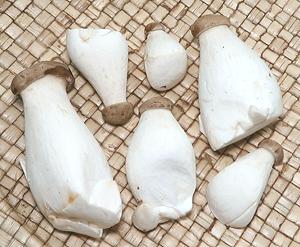 [King Oyster, Royal Trumpet; Eryngii (Japan);
Brauner Kräuter-Seitling (Germany); Pleurotus eryngii]
[King Oyster, Royal Trumpet; Eryngii (Japan);
Brauner Kräuter-Seitling (Germany); Pleurotus eryngii]
These mineature versions of the largest member of the oyster mushroom
family appeared here in Los Angeles in late 2019. They varied from
1-1/8 inches to 2-3/4 inches high. Their cooking characteristics were
just the same as the Large King Trumpets (see below). They were
purchased rom a large Asian market in Los Angeles (Alhambra) for
2019 US $2.27 / pound.
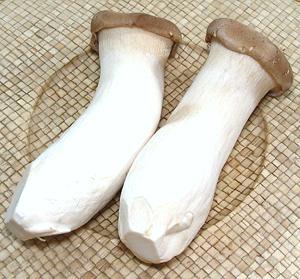 [King Oyster, Royal Trumpet; Eryngii (Japan);
Brauner Kräuter-Seitling (Germany); Pleurotus eryngii]
[King Oyster, Royal Trumpet; Eryngii (Japan);
Brauner Kräuter-Seitling (Germany); Pleurotus eryngii]
These largest of the Oyster Mushrooms are native to all sides of the Mediterranean region, but are now grown in vast quantity in China. They are available in almost all the Asian markets here in Southern California, and are harvested when they are still nearly all stem with hardly any cap. The stems are often around 2-1/2 inches diameter with caps around 3 inches diameter. The photo specimen on the right was 7-1/4 inches long, 2-1/4 inches diameter and weighed 9-5/8 ounces, a fairly normal size. Left to mature, the caps would fan out to a larger size.
These mushrooms have little flavor raw and don't work well in
salads, but they have good mushroom flavor cooked. They are usually
sliced crosswise or into lengthwise sticks or slices. Cut lengthwise,
they are more mushroomy, and crosswise they are more absorbent of
other flavors. They remain fairly firm even with long cooking.
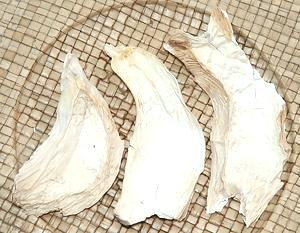 [King Oyster, Abalone Mushroom, Royal Trumpet; Eryngii (Japan);
Brauner Kräuter-Seitling (Germany); Pleurotus eryngii]
[King Oyster, Abalone Mushroom, Royal Trumpet; Eryngii (Japan);
Brauner Kräuter-Seitling (Germany); Pleurotus eryngii]
The package listed these as Pleurotus abalones, but there is no such scientific name - somebody made it up from the fact that these, and other large oyster mushrooms, are sometimes called "Abalone Mushrooms". The larges piece in the photo was 5-1/2 inches long and 2 inches wide, but there was on (less photogenic) piece in the package that was 7 inches long. They were purchased from a large Asian market in Los Angeles (San Gabriel) for 2019 US $2.29 for 2-1/2 ounces.
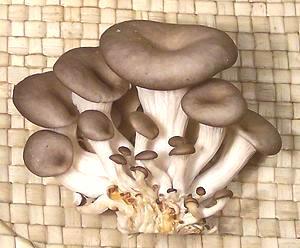 [Pleurotus pulmonarius?]
[Pleurotus pulmonarius?]
This form in clusters is not common, but occasionally available in
Southern California. While it has a more distinct cap than common
oyster mushrooms, it still displays the off-center stem. These are
firmer than the common oyster mushroom and can stand a bit more
abuse during cooking.